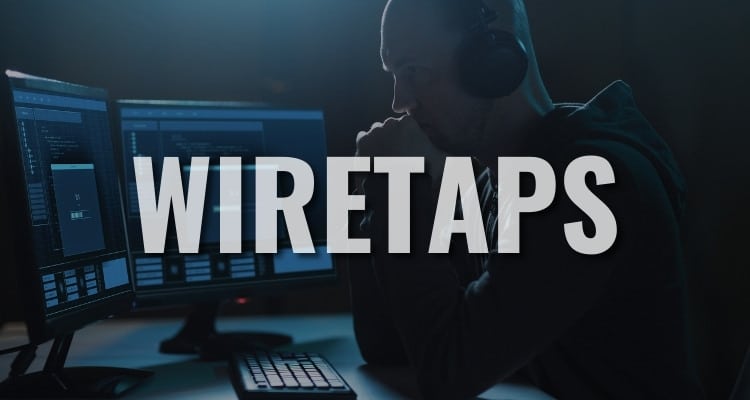Wiretaps
We Defend Those Accused of Every Type of Crime
Home » Criminal Defense » Federal Crimes » Wiretap
PRACTICE AREAS
Phoenix Wiretap Attorney
Professional & Experienced Lawyer – Available 24/7

In the age of technology, it’s no surprise that prosecutors have begun using wiretap technology to gather evidence against a defendant in court. This type of surveillance technique is generally only used to investigate serious offenses such as kidnappings, homicide, drug crimes, and white collar crimes.
It is important to remember that wiretapping laws provide strict guidelines for how police and prosecutors are able to collect evidence through this type of surveillance. If you suspect you might have been wiretapped, your next few moves are crucial. It is important that you have someone on your side who is familiar with the laws and regulations concerning wiretapping to ensure that your privacy is protected and your rights are not being violated.
Meet one of the most renowned Phoenix criminal defense attorneys: Belén Olmedo Guerra. At Belén Law Firm, we are dedicated to protecting your rights and ensuring that illegal wiretapping practices are not being used against you.
What are Wiretaps?
A wiretap is not a specific device, but rather a term used to describe what is done. It is called wiretapping because, before wireless communications existed, police and prosecutors would actually cut into a telephone wire that carried the signals from one phone to another. By cutting or “tapping” into the wire, they could monitor and surveil a suspect’s communications.
These days, with the majority of phones now being wireless, it is much easier for agents to hack into a cell phone signal and intercept telecommunications that way. It is also increasingly common to wiretap other electronic devices like computers, since so much of the world’s communication takes place via the Internet now.
Arizona Wiretapping Law
Under ARS 13-3005, Arizona is considered a “one-party consent” state. This means that intercepting a wire or electronic communication or a conversation is illegal unless you are a party to the communication, present during the conversation or discussion, or one of the parties consents. However, ARS 13-3012 exempts investigative or law enforcement agents from this law, so long as they receive a legal subpoena or court order to do so.
How Does Wiretapping Work?
In the past, wiretapping required investigators to go to the phone company’s central office and physically cut into copper phone lines with alligator clips. Now, wiretapping places phone and internet carriers at the center of the investigation. If an investigator gets approval from a judge to wiretap your calls, they will first need to contact your carrier. With the proper documentation provided and authority established, the carrier must then allow them to intercept your calls.
There are laws in place that require U.S. phone carriers and other communications providers to adhere to these lawful interceptions. These are:
- Title III of the Omnibus Crime Control and Safe Streets Act of 1968 (aka Title XVIII)
- The Foreign Intelligence Surveillance Act of 1978 (FISA)
- Communications Assistance for Law Enforcement Act of 1994 (CALEA)
- The USA Patriot Act of 2001
When the carrier grants access, a third party can either listen in immediately in real time or the calls can be recorded and played back later. For cell phones, it is likely that text messages will be intercepted, as well.
How Long Does A Wiretap Last?
A wiretap generally lasts for one month – a thirty day period. However, investigators can request an extension on the tap from a judge. Once the tap is over, the law requires that agents must cease all interception as well as inform anyone who was involved in the investigation that their conversations were tapped. This means that anyone who may have called the defendant under surveillance and had a conversation with them, regardless of what it was about, must be informed.
What are Some Defenses in Wiretap Cases?
The regulations and procedures surrounding wiretapping laws are relatively extensive. If these laws are not obeyed, defense attorneys will work to prove that the government overstepped their bounds and that the case be thrown out. Some defenses that your wiretap attorney may argue include the following:
- Authorities failed to exhaust other resources before turning to wiretapping
- Constitutional rights were violated, including protections against unlawful search and seizure
- Interceptions were conducted outside of the limited scope permitted by the law and circumstantial facts
Defenses against wiretapping require an in-depth knowledge of federal law and the regulations surrounding surveillance techniques such as wiretapping. Only a skilled legal professional such as Belén can effectively argue the above points, among others, to a court of law.
Wiretap Warrant Requirements
There are very strict procedures in place for investigators, not only when carrying out the act of wiretapping, but before they can even obtain a wiretap warrant. There are several requirements that must be met to secure this type of warrant. First and foremost, investigators must have the proper authorization. In Arizona, a wiretap must be authorized by either the Attorney General, Assistant Attorney General, or the principal prosecuting attorney of Arizona.
Next, a wiretap warrant application must provide a statement including (but not limited to) the following information:
- Agency and agent(s) applying for the wiretap
- Statement of facts
- Previous investigative techniques that have not proven to be successful in gathering evidence
- Period of time the wiretap will take place (30 days at most, unless granted extension through reapplication)
Before receiving a warrant in Arizona, the agents also have the task of convincing the court that wiretapping is actually necessary in their investigation because all other options have been unsuccessful. This means that they have exhausted all other techniques, including physical surveillance, interception of mail, use of tracking devices, and more. Essentially, wiretapping must be the investigators last resort in collecting evidence for their case.
Illegal Wiretapping
As we’ve mentioned many times before, there are several laws that regulate the surveillance technique of wiretapping, many of which can be found in ARS 13-3010. Failure to comply with these regulations indicates illegal wiretapping. First and perhaps most obvious, wiretapping without a warrant is against the law. Warrantless interception could lead to the dismissal of the case altogether.
If and when a warrant is granted, there are certain instances where the agents would be prohibited from listening. For example, conversations between a married couple, with a medical or insurance provider, or with an attorney are not within their realm of interception.
While the wiretap warrant is enacted and calls are being regularly intercepted, investigators are required to provide ongoing reports of their findings to the court. Failure to provide these reports at appropriate intervals (generally after 10 to 15 days) would be considered illegal wiretapping (ARS 13-3010 [K]).
Also illegal would be the use of wiretapping after the allowed time has expired. Under 18 U.S. Code § 2518 (5), interception can last no longer than 30 days. If during that 30 days, agents uncover new information that requires further investigation, they may apply for an extension of time. Only if it is granted by the court may they continue to use these wiretapping practices.
Within the 10 days following the termination of the legal interception, investigators must provide all recordings to the judge. These recordings and any evidence obtained through them will be sealed and used under his or her discretion as according to ARS 13-3010 (H).
Contact a Phoenix Wiretap Lawyer
The federal court system has specific laws and procedures that must be strictly adhered to, especially when it comes to wiretapping. This is why you need an experienced federal crimes attorney on your case. Belén Olmedo Guerra is a Phoenix criminal defense lawyer who is not only eligible to practice at the state level but at the federal level, as well. She is well-versed in the nuances of federal court and wiretapping rules, ensuring that your case will not be hindered by procedural mistakes.
If you feel you are currently wiretapped or will likely be wiretapped soon, or if you already have been and require legal representation, call the Belén Law Firm today. You can reach us at 602-715-0908. We offer free case evaluations and are available 24/7.
Set Up Your Free Consultation
What Our Clients Say



















